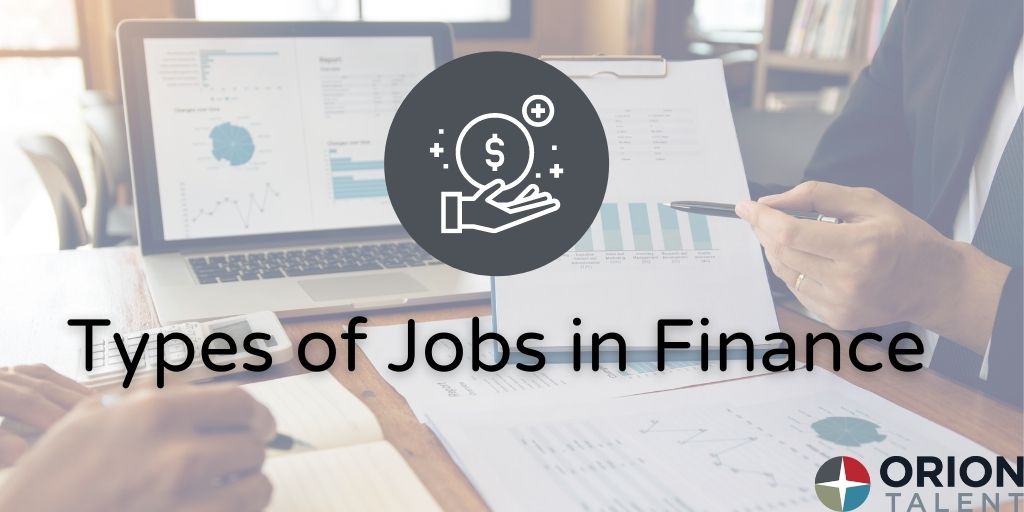
The number of finance jobs is increasing in the U.S. According to the U.S. Bureau of Labor Statistics, finance-related occupations are expected to grow by 5% between 2019 and 2029, which is faster than average compared to other industries.
What are the Different Areas Within Finance?
The four main areas of finance are corporate finance, investments, financial institutions and markets, and international finance.
Corporate finance is concerned with how businesses fund their operations in order to maximize profits and minimize costs. It deals with the day-to-day operations of a business’ cash flows as well as with long-term financing goals (e.g., issuing bonds).
In investment management, firms help their clients, who are typically large institutions and individuals with lots of money and/or valuable possessions (assets), increase their fortune. They do this by merging and investing their clients’ wealth – keeping in mind the level of risk that clients want to take and their financial goals.
Financial institutions refer to a company engaged in the business of dealing with financial and monetary transactions such as deposits, loans, investments, and currency exchange. These include banks, credit unions, savings and loans, etc.
International finance is an important tool to find the exchange rates, compare inflation rates, get an idea about investing in international debt securities, ascertain the economic status of other countries and judge the foreign markets.
What are the Most Popular Jobs in Finance?
The most popular jobs in finance can be split into three categories: Executive, Mid-level/Middle Management, and Speciality roles.
Executive
CFO - A senior executive responsible for managing the financial actions of a company. The CFO’s duties include tracking cash flow and financial planning as well as analyzing the company's financial strengths and weaknesses and proposing corrective actions.
COO - COOs assist in compiling the company’s budget, and employ strategies to safeguard assets and stock. They compile financial reports, and control financial policies and procedures. They also team up with management to implement business strategies.
CEO - A CEO oversees the organization’s financial structure, ensuring adequate and sound funding for the mission and goals of the company. They review the financial results of all operations, comparing them with the company’s objectives and taking appropriate measures to correct unsatisfactory performance and results.
HR Director - HR Directors are responsible for budget preparation; conducting financial analysis and preparing financial reports; developing and maintaining an effective system of accounting; managing the payroll system and maintaining accurate financial records for audit.
VP, HR - VPs of HR are often responsible for developing and implementing a company’s human resources business plan, establishing accountability, identifying solutions to resolve problems, and fostering a diverse workplace that enables all employees to contribute to the organization at their full potential
Vice President - The Vice President is responsible for processing the financial activities of an organization to maximize a company’s profits and plan for its growth. The role includes analyzing data and advising top executives on ways to use that information to make strategic decisions about the organization’s future.
VP, Financial Planning and Analysis - The VP, Financial Planning and Analysis are responsible for the company’s day-to-day execution of the company’s global Financial Planning and Analysis operations. They lead company-wide processes including annual operating plan and long range planning, as well as oversee the monthly forecasting process.
Senior VP, Finance - The Senior VP, Finance oversees the planning, development, implementation, and maintenance of the company’s administrative and financial services and departments, supporting and promoting profitable goals and objectives.
Director of Financial Planning and Analysis - The Director of Financial Planning and Analysis leads the budgeting, forecasting, long-term planning, implementation, and business strategic analysis of the financial team. They conduct financial analysis, modeling, forecasting and reporting efforts to ensure efficient financial operations.
Compliance Director - Responsibilities for the Compliance Director include writing clear summarization reports of new external regulations, designing and implementing internal policies to meet external regulations, and running internal audits which check for adherence with external policies.
Director, Financial Reporting - The Director, Financial Reporting directs and oversees the preparation and distribution of all periodic financial statements for external use. They ensure that reports, filings and documentation complies with company’s regulations, professional standards, and SEC and GAAP reporting guidelines.
Controller - The Controller manages accounting records and is responsible for the production of financial reports. The Controller oversees all employees involved in the accounting process, including accounts receivable, accounts payable, payroll, inventory and compliance.
Tax Director - Tax Directors create and implement a strategic tax plan for the company. Job duties include preparing and filing tax documents and returns, including for payroll and income tax, writing detailed tax reports, and addressing any tax errors or issues that arise.
Treasury Director - The Treasury Director executes the development and implementation of treasury functions. They allocate cash balances, maintain investment records, and prepare expense and earning forecasts. Being a Treasury Director ensures policies and procedures meet the organization’s objectives, needs, and regulatory body requirements.
Audit Director - An Audit Director directs the auditing of accounting and financial data of various departments within an organization. They design, develop, and implement internal auditing policies and procedures consistent with the organization's standards.
Director of Operations - The Director of Operations is responsible for overseeing many of a business’s daily activities, directing and coordinating actions across an organization. They also oversee the various departments in the business, and can locate areas for improvement.
Payroll Director - Payroll Directors are responsible for overseeing all the payroll procedures of a company. Their duties include administering monthly payments to staff members, as well as managing personnel in charge of payroll preparations. They also report any payroll-related issues to top management.
Pricing Manager and Director - The Pricing Manager and Director leads and directs pricing strategy formulation and takes necessary pricing actions to enhance profitability, ensuring integrity and accuracy in all pricing matters. They also assist with pricing negotiations of customers’ proposals.
Mid-level/Middle Management
Finance Manager - Finance Managers are business specialists who manage important financial functions of an organization. They produce financial reports, manage investment activities, and create strategies and plans for the long-term financial goals of an organization.
Financial Planning and Analysis Manager - The Financial Planning and Analysis Manager is in charge of business forecasting. He or she looks at the company’s finances with a critical eye - trying to spot data anomalies, trends, or deviations - and then introduces strategies for improvement.
Senior Manager, Financial Planning and Analysis - The Senior Manager, Financial Planning and Analysis oversee projects for junior analysts and provide high-level analysis for the data they collect. They act as a liaison with other departments and present reports to managers. Senior Manager, Financial Planning and Analysis can contribute to implementing corporate operations plans to meet budgeting goals and projections.
Manager, Financial Reporting - The Manager, Financial Reporting is responsible for managing the preparation and distribution of periodic financial statements for external use. They ensure that reports, filings and documentation complies with company regulations, professional standards, and SEC and GAAP reporting guidelines.
Assistant Controller - The Assistant Controller assists with management of accounting, auditing and budgeting within the organization. They assist with preparations for audits, work to reconcile accounting inaccuracies or imbalances, and ensure compliance with and prepare reports according to applicable government regulations.
Tax Manager - Tax Managers are primarily responsible for accurately preparing and filing state and federal tax documents. In addition, Tax Managers develop tax strategies and policies that help the client or business maintain compliance with local and federal tax laws and regulations.
Treasury Manager - A Treasury Manager oversees the cash flow and revenue of a business. They are in charge of the organization’s overall finances, including managing financial risk. Their main job duties are to monitor day-to-day operations while overseeing a long-term financial strategy.
SEC Reporting Manager - The SEC Reporting Manager manages and supervises the preparation, analysis and coordination of SEC reports, consolidated financial analysis, and other financial reports for use by management, shareholders and outside agencies.
Audit Manager - An Audit Manager is responsible for organizing and managing internal audits according to audit plans. The responsibilities of Audit Managers include overseeing the process of audits, making recommendations on policies, and ensuring that the organization fulfills international and governmental obligations of compliance.
Procurement Manager - A Procurement Manager is responsible for ensuring that their business purchases the goods and services that will best help them achieve their goals.
Specialty
Mergers & Acquisitions (M&A) Specialist - Mergers and Acquisitions (M&A) Specialists facilitate the purchase or consolidation of companies from inception to the final merger. A merger is a complicated process, and the responsibilities of M&A Specialists vary depending on the stage of a transaction.
Underwriter - Underwriters are responsible for deciding whether a borrower’s loan application is approved or not. If a potential borrower applies for a loan from a mortgage, insurance, loan broker or any other type of financial institution, it is an underwriter who evaluates risk presented by the entire loan application.
Private Equity Specialists - Private Equity Specialists work for investment banks or in mergers and acquisitions, or equities divisions of a company. They are required to raise money from banks, high net worth individuals, and private firms to chase returns beyond those offered by public stock exchanges. ... Raising money from other companies.
Venture Capitalist - Venture Capitalists usually work within a firm to seek out investment opportunities for their own clients. It’s the job of a Venture Capitalist to analyze the risks and growth potential of an emerging business and make a deal with companies they feel can succeed.
Real Estate Manager - A Real Estate Manager is responsible for evaluating and securing commercial property for the business. They may assess property values and forecast the investment of the property over time. Real Estate Managers often work with others in finance at the organization to make sure the properties they secure are sound financial decisions. Real Estate Managers may have a degree in real estate, business or finance and have some experience working in one of those same fields.
Benefits Manager - A Benefits Manager is responsible for selecting and administering a corporation’s benefits program for employees. They may obtain quotes from different vendors and ensure that any benefits plans they implement make fiscal sense for the organization.
Financial Analyst - A Financial Analyst is responsible for guiding a business in their investments and other financial decisions. They research how assets, bonds, commodities and other investments are performing so they can provide thorough and educated advice to company stakeholders.
Fund Manager - A Fund Manager is responsible for implementing a fund’s investment strategy and managing its trading activities. They oversee mutual funds or pensions, manage analysts, conduct research, and make important investment decisions.
Portfolio Manager - Portfolio Managers are primarily responsible for creating and managing investment allocations for private clients. A Portfolio Manager determines a client’s appropriate level of risk based on the client’s time horizon, risk preferences, return expectations, and market conditions.
Risk Manager - The role of a Risk Manager is to communicate risk policies and processes for an organization. They provide hands-on development of risk models involving market, credit and operational risk, assure controls are operating effectively, and provide research and analytical support.
Hedge Fund Manager - Hedge Fund Managers make investment decisions on placing investments on behalf of their clients using aggressive investment strategies. Their responsibility involves helping investors with managing their investment objectives, liquidity needs, and fee structures.
Auditor - Auditors are skilled in maintaining and organizing financial data. An Auditor is responsible for analyzing an organization's reports and records, and they aid firms by ensuring public records are kept accurate and confirming the proper payment of taxes. Auditors also communicate financial information for organizations, individual people and the federal, state and local governments.
Market Researcher - A Market Researcher interprets findings to determine pricing strategies, forecast future trends, and help develop targeted marketing strategies and tactics. They assess the impact and performance of marketing programs and strategies and work with sales and marketing teams to develop solutions.
Cost Estimator - Cost Estimators collect and analyze data in order to estimate the time, money, materials, and labor required to manufacture a product, construct a building, or provide a service.
Statistician - Statisticians develop statistical models, perform statistical analysis and develop predictive models; monitor and validate model performance and updating models as needed; and develop and maintain various databases.
Economist - Economists are financial experts who study market activity. Their primary responsibilities include collecting and analyzing financial and socioeconomic data, advising businesses and governments on economic decisions, and developing models for economic forecasting.
What Types of Careers in Finance are Growing the Fastest?
As the stock market fluctuates and the monthly jobs rates vary, financial jobs increase. An aging population also creates a need for retirement planning, as baby boomers are in the midst of retiring and millennials prepare for retirement. Therefore, a lot of wealth management jobs become available during these times, due to an increased focus on wealth management and risk management, as well as acquiring real estate.
Conclusion
If you have the right education and problem-solving abilities, a career path in the finance field could lead to a CFO position. With clear career progression paths often evident, moving from an entry-level position to a mid-band or senior role is more easily mapped out
A career in finance is a more stable career field, with opportunities available in a variety of industries worldwide. Even outside the finance industry, finance careers can be found in every industry, to include Healthcare, Hospitality, Manufacturing, Oil & Gas, Real Estate, and Telecommunications, among many others. Every company, no matter the size, needs a well-structured finance department in order to be successful.
Ready to get started with a career in the Finance industry? Search jobs in Finance and Accounting or reach out to our Finance industry recruiting experts, Yasmine O’Brien, Daniel Frank, and Jackie Deace.
Archives
- January 2026
- December 2025
- November 2025
- October 2025
- September 2025
- August 2025
- July 2025
- June 2025
- May 2025
- April 2025
- March 2025
- February 2025
- October 2024
- May 2024
- March 2024
- February 2024
- January 2024
- December 2023
- November 2023
- October 2023
- September 2023
- August 2023
- July 2023
- June 2023
- May 2023
- April 2023
- March 2023
- February 2023
- January 2023
- December 2022
- November 2022
- October 2022
- September 2022
- August 2022
- July 2022
- June 2022
- May 2022
- April 2022
- March 2022
- February 2022
- January 2022
- December 2021
- November 2021
- October 2021
- September 2021
- August 2021
- July 2021
- June 2021
- May 2021
- April 2021
- March 2021
- February 2021
- January 2021
- December 2020
- November 2020
- October 2020
- September 2020
- August 2020
- July 2020
- June 2020
- May 2020
- April 2020
- March 2020
- February 2020
- January 2020
- December 2019
- November 2019
- October 2019
- September 2019
- August 2019
- July 2019
- June 2019
- May 2019
- April 2019
- March 2019
- February 2019
- January 2019
- December 2018
- November 2018
- October 2018
- September 2018
- August 2018
- July 2018
- June 2018
- May 2018
- April 2018
- March 2018
- February 2018
- January 2018
- December 2017
- November 2017
- October 2017
- September 2017
- August 2017
- July 2017
- June 2017
- May 2017
- March 2017
- February 2017
- January 2017
 RSS Feed
RSS Feed




















